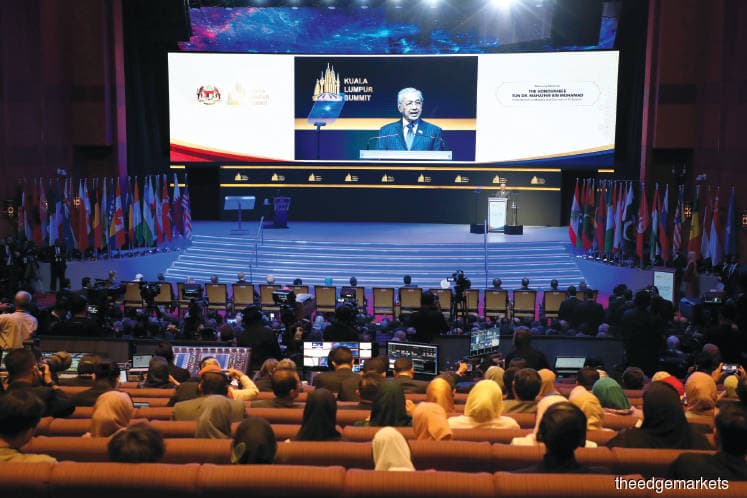
This article first appeared in The Edge Malaysia Weekly on December 30, 2019 - January 5, 2020
QUITE a number of reviews of the recently concluded Kuala Lumpur Summit have been unflattering, with analysts and commentators highlighting the absence of Islamic nations that matter and the last-minute pullout of Muslim leaders who had initially agreed to attend.
There are those who view this as a slap in the face for Prime Minister Tun Dr Mahathir Mohamad, the host, calling his approach dated and out of touch with present-day realities, particularly with regard to problems faced by the Muslim world, which the summit aimed to address.
And for local flavour, observers could not help but notice that prime minister-in-waiting, Datuk Seri Anwar Ibrahim, was in the background despite his Islamic credentials while PAS president Datuk Seri Abdul Hadi Awang received a personal invitation from Mahathir. Even controversial preacher Zakir Naik was there.
Local commentators had a field day presenting their theories when Turkey President Recep Tayyip Erdogan skipped the official dinner reception hosted by Mahathir to host a dinner of his own exclusively for Anwar.
But the KL Summit was not about Mahathir or Anwar.
Granted, it was snubbed by Saudi Arabia because it felt the summit was designed to replace the Organisation of Islamic Cooperation, which is under the kingdom’s de facto leadership.
A few days before the opening of the summit, the OIC mounted a veiled attack on it, saying such a gathering would weaken Islam and divide the Muslims.
It is widely believed that Pakistan Prime Minister Imran Khan’s last-minute cancellation of his attendance at the KL Summit was due to Saudi pressure or, at the very least, according to observers, to assuage his ally’s concerns.
Senior media adviser to the prime minister, Datuk Kadir Jasin, via his Facebook posting before the start of the summit, said it was all right for any leader not to attend the summit as it was also all right if there were leaders who were preventing others from attending. “Perhaps”, he wrote, “they don’t understand or have their own agenda.”
But he added that “we have to accept the fact that not all countries that are independent are free”.
To political analyst Professor Dr Ahmad Fauzi Abdul Hamid, it is “patronising and perhaps even laughable of the OIC to think of itself as the sole legitimate voice of Muslims worldwide and of Saudi Arabia as the pivot of the Islamic world just because all Muslims flock to Makkah and Medina for Haj and Umrah”.
As Fauzi sees it, the OIC has failed to address pressing issues facing Muslims, such as the persecution of the Uyghurs in China, the genocide of the Rohingyas, not to mention the Palestinian issue. What is more, under de facto leader Mohammed bin Salman, or MbS as the crown prince is better known, Saudi Arabia is said to be gravitating towards the Israeli and the US in foreign policy.
Differing from the view of many analysts that the Kuala Lumpur Summit was an abject failure, Fauzi says, “If there is one good thing that has happened in the post-GE14 era, it has to be Malaysia distancing itself from being a pawn of Saudi foreign policy.”
The expert in political Islam adds that the withdrawal of Malaysian troops from the Yemen conflict and the abandonment of the King Salman Centre for International Peace reflect a courageous defiance against Saudi’s bullying disposition in portraying itself as patron of the ummah through institutions like the OIC, Rabithah Alam Islami and WAMY, which, according to him, are “propaganda tools for Wahhabi/Salafist Islamism that has indirectly or directly contributed to the terrorism scourge post- 9/11”.
Fauzi sees in the Kuala Lumpur Summit a portrayal of Malaysia and Turkey as “creative leaders of a Muslim world that seeks to chart new avenues and initiatives away from the long-standing Saudi Arabia-Iran rivalry”.
Malaysia and Turkey apart, he points out the fact that of the other countries whose leaders attended the summit, only Qatar (which two years ago had a high-profile spat with Saudi Arabia) and Iran are located in the Middle East.
Pakistan and Indonesia (whose leaders backed out of the summit) are non-Arab. Indonesia has the largest Muslim population in the world and for the record, Turkey, Pakistan and Malaysia are part of a tripartite alliance to speak for the global Muslim community.
So, asks Fauzi, “are we seeing a change in the direction of the ummah in terms of leadership, away from the Middle East, considering that Turkey may also be deemed non-Middle Eastern in not having Arabic as its primary language, as is the case with Iran?”
A big question indeed.
Mohsin Abdullah is a contributing editor at The Edge. He has covered politics for more than four decades.
Save by subscribing to us for your print and/or digital copy.
P/S: The Edge is also available on Apple's AppStore and Androids' Google Play.